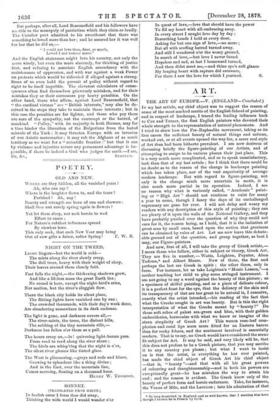"PERISH INDIA !"
[TO THE EDITOR OF THE .SPECTATOR."] SIR,—Mr. Freeman, in a letter which appeared in the Daily News of Saturday last, expresses much surprise that the words "Perish India!" are still attributed to him, though he never uttered them, or was reported to have uttered them. The phenomenon seems to me interesting, but by no means surprising. It may be worth inquiring why this particular misstatement shows such remark- able vitality. A falsehood pure and simple dies at its birth ; it lives on only when it can be made to serve some useful purpose. In the present case, e.g., Cabinet Ministers would not have harped upon the words "Perish India !" merely for the sake of holding up to obloquy or ridicule an opponent who is not a pro- fessional politician ; and it does not need the acumen of Lord Cairns, or even of Sir Stafford Northcote, to see that these words never were used by Mr. Freeman, or anybody else, without some context that determined their meaning. These gentlemen know also that if an opponent had made use of these words in the sense they are pleased to attribute to them, he would be beneath their notice, and that his friends, so far from being influenced by him would begin to inquire seriously whether he was capable of managing his own affairs. What, then, can have been the object of the " Conservatives" in persisting in this misrepre- sentation? There is no great difficulty in discovering. There are still a great number of Englishmen who, while differing among themselves on many important questions, and called by various party names, maintain that the first care of our Govern- ment should be for justice and international morality. Opposed to them, then, is a party, with a majority in both Houses of Parliament, which holds that the first duty of our Government is to uphold the power of England. This should be done by fair means, if possible (recte, si possis); but if measures of doubtful morality seem necessary, the Government cannot afford to be scrupulous. Politicians of this stamp are embarrassed by such a declaration as Mr. Freeman's,—" Perish, the interests of England, perish, our dominion in India, rather than we should strike one blow or speak one word in behalf of the wrong against the right !" They naturally shrink from such an assertion, and yet they do not feel comfortable in maintaining the opposite, so they take refuge in evasion, and try to raise a false issue.
Because Mr. Freeman, and those who agree with him, admit that there is something more precious in their eyes than the power of England, the members and followers of the present Government
accuse them of being indifferent to the power of England. In bringing this charge, "Perish India!" comes in with good effect.
Those who do not approve of an unscrupulous foreign policy are "cosmopolitan," who care not a button for their country or their , country's greatness, and whose motto is, "Perish, India!"
But perhaps, after all, Lord Beaconsfield and his followers have no title to the monopoly of patriotism which they claim so loudly. The Cavalier poet admitted to his sweetheart that there was something he loved more than her ; and he assured her it was well for her that he did so,— "I could not love thee, dear, so much,
Loved I not honour more."
And the English statesman might love his country, not only the more wisely, but even the more sincerely, for thinking of justice first, and refusing to associate English ascendancy with the maintenance of oppression, and with war against a weak Power on pretexts which would be ridiculed if alleged against a strong. Some of us even hold the pursuit of policy without regard to right to be itself impolitic. The cleverest calculators of conse- quences often find themselves grievously mistaken, and for their mistakes they or their successors pay heavy penalties. On the other hand, those who affirm, against Lord Beaconsfield, that "the cardinal virtues" are "British interests," may also be de- ceived in the steps they take to maintain those interests ; but in this case the penalties are far lighter, and those who pay them are sure of the sympathy, not the contempt or the hatred, of mankind. "Policy," with its majority in both Houses, may for a time hinder the liberation of the Bulgarians from the hated misrule of the Turk ; it may threaten Europe with an invasion of our Asiatic mercenaries ; it may rob the Afghans of as much territory as we want for a "scientific frontier ;" but that it can by violence and injustice secure any permanent advantage is im- possible, if there be indeed a God who judges the earth.—I am,



































 Previous page
Previous page